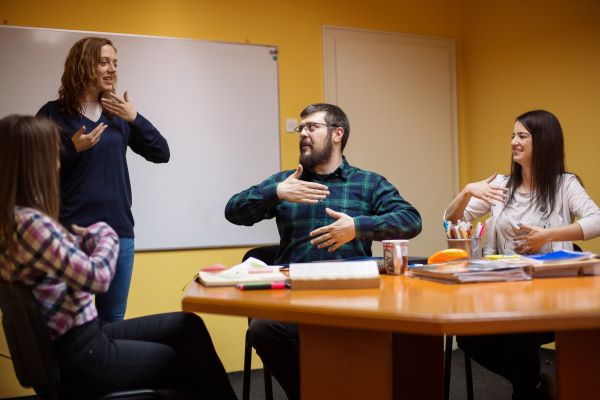Developing strong community partnerships is essential to family engagement and overall family well-being. When strong, collaborative relationships are developed with community organizations, families can benefit from additional services and resources in areas such as health, mental health, education, housing, finance, and workforce development (45 CFR §1302.53). It is important to recognize when outside referrals benefit parents since community-based organizations offer specialized programs and services to people regarding their specific disabilities or learning differences. Engaging Community Partners to Strengthen Family Services is one such resource series that provides a variety of resources that can guide this process.
“My EHS program is always super supportive. Whenever I have needs and I don’t know what to do, they are always helpful. They connected us to therapy — mental health, grief therapy, and counseling that my kids needed when their dad died.” – Early Head Start parent
Parents with disabilities and learning differences benefit from similar services and resources that other parents do. However, services and resources may need to be adapted to address their disability or learning difference. Parents also may benefit from services and resources designed specifically to address their disability or learning difference. This includes information, materials, and support for engaging in advocacy.
 The National Council on Disability, explains that all families are interdependent and may rely on help from friends, families, and the community. Parents with disabilities and learning differences need similar supports and may need to go outside their existing networks to receive them. For example:
The National Council on Disability, explains that all families are interdependent and may rely on help from friends, families, and the community. Parents with disabilities and learning differences need similar supports and may need to go outside their existing networks to receive them. For example:
- Housing, transportation, and health care are vital services and resources for all families. A family that includes a person with a disability may require wheelchair accommodations. The family may also have chemical sensitivities, respiratory difficulties, or other issues.
- Personal assistance services (PAS) are needed by some disabled parents to assist with household and personal care tasks like cleaning, bathing, or grocery shopping.
- Child care tasks like “carrying children, organizing supplies and clothing, disciplining children, playing with children, bathing children, childproofing the home, and advocating for children” were areas on which parents with physical and mental health disabilities reported needing assistance.
Identifying Organizations That Support and Advocate for Parents with Disabilities and Learning Differences
Your existing network of organizations, staff, and families may help you identify other potential local partners and affiliates. Involve parents and staff with disabilities or learning differences as you identify and develop community partnerships.
Many organizations that support and advocate for adults with disabilities and learning differences promote an independent living philosophy. According to the Administration for Community Living (ACL), independent living programs “promote a philosophy of independent living — including a philosophy of consumer control, peer support, self-help, self-determination, equal access, and individual and system advocacy — in order to maximize the leadership, empowerment, independence, and productivity of individuals with disabilities, and the integration and full inclusion of individuals with disabilities into the mainstream of American society.”
The resources below can help you identify local organizations that specialize in supporting disabled adults and adults with learning differences.
- Reach out to ACL’s Disability Information and Access Line (DIAL) to talk, text, or email with an information specialist who can connect you to local resources on independent living. DIAL provides connections for information on local transportation, housing resources, and disability rights and advocacy support. Communication in American Sign Language is available.
- Find local Centers for Independent Living for information on staff training, advocacy, peer counseling, and resources.
- Visit the National Research Center for Parents with Disabilities’ website for a state-by-state list of protection and advocacy organizations.
- Explore the local affiliates of national organizations that support and advocate for people with specific disabilities.
- ARC chapters provide resources and support for people with intellectual and developmental disabilities.
- The National Federation of the Blind offers resources to support blind parents and links to state affiliates.
- The National Alliance on Mental Illness connects you to state and local affiliates for information, support, education, and advocacy.
- The National Association of the Deaf, with four regional affiliates, delivers resources directly to parents and service providers.
- Associations that support people with specific conditions, like multiple sclerosis, can connect you to local resources and information about living with the condition.
Developing Community Partnerships
Once a potential partnership has been identified, use Tools for Planning Community Partnerships as a resource to develop a mutually engaged community partnership. This planning tool provides a six-step process for effective action. As you go through this process:
- Identify ways the partnership can support parents with disabilities and learning differences.
- Explore the ways people with disabilities and learning differences participate in the leadership, development, and delivery of program services for an organization.
- Consider what accommodations, if any, are needed to ensure building spaces, materials, communication methods, and information shared are fully accessible to all families.
Last Updated: May 16, 2024